Full Title: Pathways to Urban Sustainability: Challenges and Opportunities for the United States
Author(s): Committee on Pathways to Urban Sustainability: Challenges and Opportunities; Science and Technology for Sustainability Program; Policy and Global Affairs; National Academies of Sciences, Engineering, and Medicine
Publisher(s): The National Academies Press
Publication Date: October 1, 2016
Full Text: Download Resource
Description (excerpt):
Intended as a comparative illustration of the types of urban sustainability pathways and subsequent lessons learned existing in urban areas, this study examines specific examples that cut across geographies and scales and that feature a range of urban sustainability challenges and opportunities for collaborative learning across metropolitan regions. The study committee chose nine cities: Los Angeles, California; New York City, New York; Philadelphia, Pennsylvania; Pittsburgh, Pennsylvania; Grand Rapids, Michigan; Flint, Michigan; Cedar Rapids, Iowa; Chattanooga, Tennessee; and Vancouver, Canada. These cities were selected to represent a variety of metropolitan regions, with consideration given to city size, proximity to coastal or other waterways, susceptibility to hazards, primary industry, water scarcity, energy intensity and reliability, vertical density, transportation system performance, and social equity issues. The committee chose two cities, Los Angeles and Chattanooga, as the sites for its public data-gathering meetings due to their diverse characteristics in terms of size, geography, and varied sustainability challenges, such as water and air quality.
